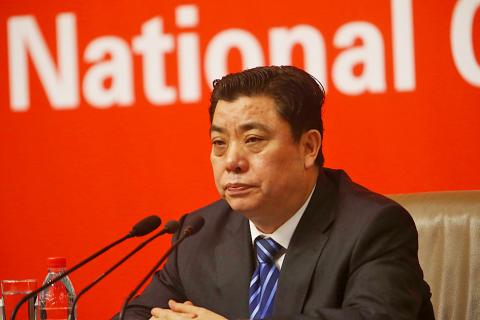China is using economic incentives to target 10 types of groups in Taiwan as part of its “united front” tactics, an unnamed government official said, citing national security intelligence.
The official said the groups targeted for engagement are local townships, young people and students, Chinese spouses of Taiwanese, Aborigines, pro-China political parties and groups, temples, descendants of Chinese who retain roots in China, labor groups, farmers’ and fishermens’ associations, and military veterans.
The government had previously estimated that China spends at least NT$10 billion (US$337.8 million) per year enticing Taiwanese to join united front efforts, but they believe that there might be more “invisible funding.”

Photo: CNA
China uses economic incentives when cultivating Chinese spouses, Aboriginal leaders, and local township and religious organizations, the official said, adding that Beijing might provide free visits to China or direct benefits to improve China’s approval rating.
China is also attempting to establish internal aid in Taiwan to direct public affairs and political activities, the official said.
Different levels of officials from China’s Taiwan Affairs Office (TAO), United Front Work Department (UFWD) of the Chinese Communist Party’s Central Committee and other groups have used Taiwan’s pro-unification groups and pro-China associations to arrange visits to Taiwan, gradually affecting exchanges using united front strategies, another unnamed source familiar with the matter said.
Trade groups, Chinese-funded firms and the local offices of Chinese businesses have members who also hold Chinese government positions, the source said, adding that these people cooperate with instructions from China.
During former president Ma Ying-jeou’s (馬英九) administration, Xiamen University’s Taiwan Research Institute and other Chinese think tanks researched Taiwan’s political and economic development and social sentiment for a long period in the name of academic cooperation and field research, the source said.
The organizations claimed that hotel costs were too high and rented homes in Taiwan for professors and students, the source said, adding that the groups used this opportunity to collect intelligence.
A suspected “price list” set by the TAO has emerged in a case involving New Party spokesman Wang Ping-chung (王炳忠), a national security official said.
Prosecutors have also found several million yuan in the accounts of other pro-China political parties and groups, the official said.
China has also hinted to political party members that if they gather military information in Taiwan, China would compensate them generously, while others have traveled to China to interact with national security officials and accept funds, the official added.
These cases are difficult to investigate, because it is not easy to prove that the money in those accounts was given by Chinese intelligence agencies or agencies involved with Taiwan, the official said.
Meanwhile, Chinese divisions involved with Taiwan are spread throughout several Chinese party, government and military divisions, including the UFWD, the Taiwan affairs system, think tanks and other divisions, the official said.
Taiwan has continuously tracked China’s attempts to influence Taiwanese politics and society, and has reacted appropriately, they added.

INVESTIGATION: The case is the latest instance of a DPP figure being implicated in an espionage network accused of allegedly leaking information to Chinese intelligence Democratic Progressive Party (DPP) member Ho Jen-chieh (何仁傑) was detained and held incommunicado yesterday on suspicion of spying for China during his tenure as assistant to then-minister of foreign affairs Joseph Wu (吳釗燮). The Taipei District Prosecutors’ Office said Ho was implicated during its investigation into alleged spying activities by former Presidential Office consultant Wu Shang-yu (吳尚雨). Prosecutors said there is reason to believe Ho breached the National Security Act (國家安全法) by leaking classified Ministry of Foreign Affairs information to Chinese intelligence. Following interrogation, prosecutors petitioned the Taipei District Court to detain Ho, citing concerns over potential collusion or tampering of evidence. The

Seventy percent of middle and elementary schools now conduct English classes entirely in English, the Ministry of Education said, as it encourages schools nationwide to adopt this practice Minister of Education (MOE) Cheng Ying-yao (鄭英耀) is scheduled to present a report on the government’s bilingual education policy to the Legislative Yuan’s Education and Culture Committee today. The report would outline strategies aimed at expanding access to education, reducing regional disparities and improving talent cultivation. Implementation of bilingual education policies has varied across local governments, occasionally drawing public criticism. For example, some schools have required teachers of non-English subjects to pass English proficiency

NEGOTIATIONS: The US response to the countermeasures and plans Taiwan presented has been positive, including boosting procurement and investment, the president said Taiwan is included in the first group for trade negotiations with the US, President William Lai (賴清德) said yesterday, as he seeks to shield Taiwanese exporters from a 32 percent tariff. In Washington, US Trade Representative Jamieson Greer said in an interview on Fox News on Thursday that he would speak to his Taiwanese and Israeli counterparts yesterday about tariffs after holding a long discussion with the Vietnamese earlier. US President Donald Trump on Wednesday postponed punishing levies on multiple trade partners, including Taiwan, for three months after trillions of US dollars were wiped off global markets. He has maintained a 10 percent

TRADE: The premier pledged safeguards on ‘Made in Taiwan’ labeling, anti-dumping measures and stricter export controls to strengthen its position in trade talks Products labeled “made in Taiwan” must be genuinely made in Taiwan, Premier Cho Jung-tai (卓榮泰) said yesterday, vowing to enforce strict safeguards against “origin laundering” and initiate anti-dumping investigations to prevent China dumping its products in Taiwan. Cho made the remarks in a discussion session with representatives from industries in Kaohsiung. In response to the US government’s recent announcement of “reciprocal” tariffs on its trading partners, President William Lai (賴清德) and Cho last week began a series of consultations with industry leaders nationwide to gather feedback and address concerns. Taiwanese and US officials held a videoconference on Friday evening to discuss the